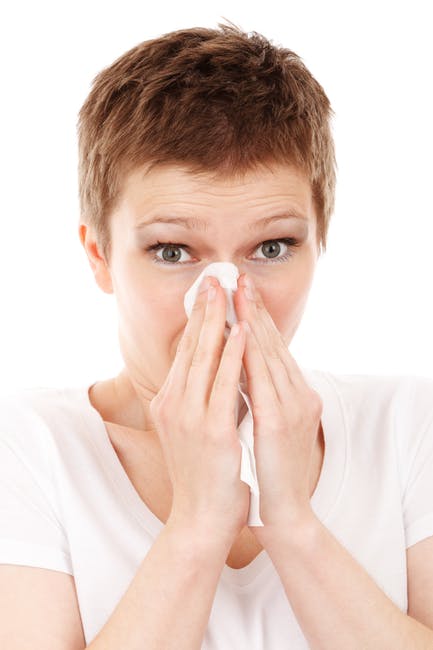
Pesky Allergies vs Cold: Can You Tell the Difference?

You feel run-down, almost like you’re carrying weights on your back. Your head feels tight, almost like it’s going to explode. You have a cold . . . or do you?
While you may feel as though you’re afflicted with a cold, you could actually be experiencing allergy symptoms.
Curious as to the differences with allergies vs cold? Then read on. We’re going to get into the specifics below.
What Causes a Cold?
To put it simply, colds are caused by viruses. While there over 200 different viruses which can cause a cold, the most common cold-causing virus is the rhinovirus.
Viruses are transmitted through the air, typically spread person-to-person after an affected individual has coughed or sneezed. This is why those living together often contract colds around the same time.
What Causes Allergies?
Allergies are inherent within a specific person. Individuals with allergies have immune systems which react abnormally in the face of usually-harmless stimuli. For instance, while most individuals are perfectly suited to eat peanuts, some are allergic to them.
The stimuli which most commonly trigger allergies include dust mites, pollen, mold, and pet dander. Some individuals are allergic to bee stings and synthetic substances as well.
Allergies vs Cold: The Similarities
Allergies and colds tend to present a number of like symptoms. Their most common like symptoms include the following.
Congestion
Congestion is exceedingly common among both allergies and colds. If your nose is stuffed up and your head feels numb, you could be afflicted with either one of these conditions.
Runny Nose
Have a runny nose? Again, both allergies and cold could be the culprit. This is a very common symptom for both conditions.
Post-Nasal Drip
Along with congestion and a runny nose comes post-nasal drip. This is the terminology used to describe mucus dripping down the throat. Again, whether you have a cold or allergies, you’re bound to experience it.
Sneezing
Sneezing accompanies both allergies and the cold. Note, however, that those with allergies tend to sneeze more often than those with a cold.
Coughing
Coughing is also a symptom of both allergies and the cold. Note, however, that it tends to occur more in those suffering from a cold.
Pink Eye
Pink eye or conjunctivitis can sometimes be brought on by colds and allergies. Make note, though, that allergic conjunctivitis will not produce quite the same effects as viral conjunctivitis. For instance, while viral conjunctivitis will produce discharge, allergic conjunctivitis generally won’t.
Allergies vs Cold: The Differences
While they share a number of similarities, allergies and colds have a number of differences as well. The most prominent of these differences will be reviewed below.
Colds Can Come With Fevers
One of the biggest differences between colds and allergies is that colds can produce fevers. While high body temperatures do not always accompany colds, they are still fairly common. That being said, the fevers that accompany colds typically don’t exceed101 degrees Fahrenheit.
Allergies Don’t Typically Produce Sore Throats
Both allergies and colds can produce sore throats. However, the type of sore throats that they produce are different. Not to mention, colds produce sore throats at a higher rate than what is associated with allergies.
An allergy-induced sore throat will be characterized by dryness, including only minor levels of pain. A cold-induced sore throat will be painful, so painful, in fact, that it will be difficult for you to swallow.
Soreness is Not a Symptom of Allergies
One of the common symptoms of a cold is body soreness. The aches and pains induced by a cold will cause your bones to feel creaky and cause your muscles to feel strained.
This is not true of allergies. In and of themselves, allergies do not result in body soreness.
Colds Do Not Result in Eczema
A symptom that presents itself in some allergic individuals is eczema. Eczema is a skin condition which results in red, dry, and itchy skin, and which can come in short bursts or long assaults.
Contrary to allergies, colds are never accompanied by eczema. Though you could have eczema during a cold, it would be the result of an entirely different condition.
Treatment for Colds
There is no cure for the cold. However, you can treat it to reduce its symptoms. There are a number of treatments available, some of which are approved by licensed physicians and some of which are considered home remedies.
Primarily, you need to get adequate rest and drink adequate water. Sleep will strengthen your immune system, allowing it to fight off the virus that’s causing the cold. Water will help not only to keep you hydrated but to loosen up congestion.
There are quite a few cold and cough medications that you can utilize as well. Advil (ibuprofen) and Tylenol are two of the most popular.
Treatment for Allergies
As with colds, allergies can be treated via a variety of home and physician-approved remedies. Generally, a good mixture of these remedies helps to keep symptoms to a minimum.
Steam is believed to help with allergies, as it can loosen up congestion and add moisture to the air. All you have to do to reap the benefits of steam is take a hot shower for 15 to 20 minutes. The steam will build up in your bathroom and work its magic.
The other option is to take medication. Antihistamines, nasal sprays, decongestants, and even allergy shots can prove effective in staving off the effects of allergies.
Buy Medicine Now
When it comes to allergies vs cold, the type of medicine you choose is vital. Whereas some medicines are designed to treat cold symptoms specifically, other medicines are designed to treat allergy symptoms specifically.
Regardless of whether you’re suffering from a cold or allergies, we here at Kiwi Drug have a medicine for you.
Related Posts

Can Mounjaro Cause Hair Loss? Uncover the Facts
July 13, 2024